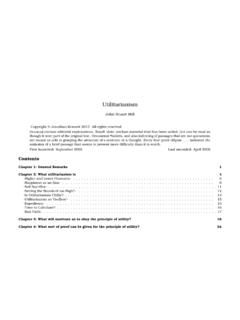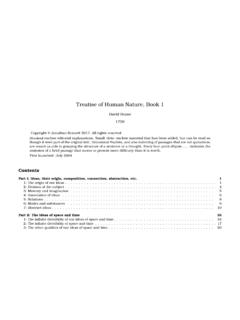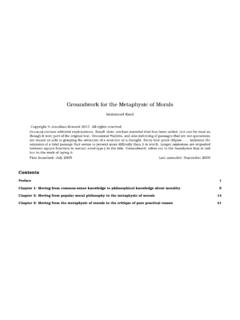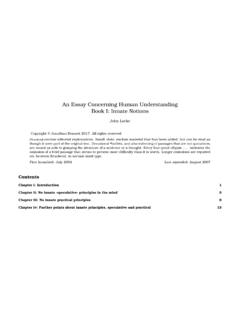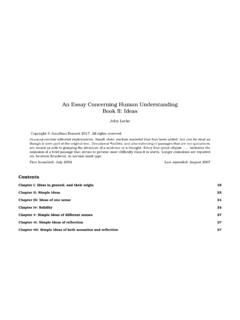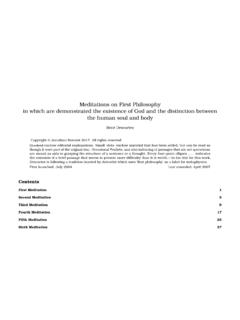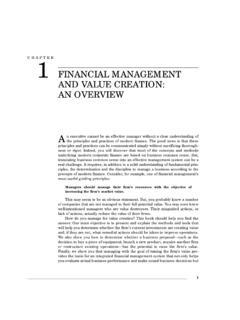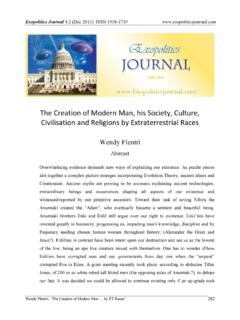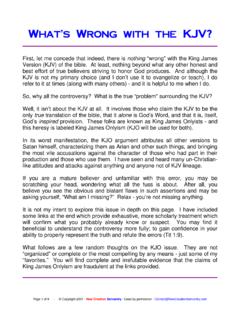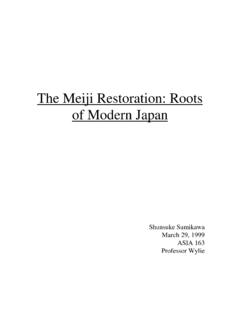Transcription of Leviathan Part 2. Commonwealth - Early Modern Texts
1 Leviathan Part 2. Commonwealth Thomas Hobbes Copyright Jonathan Bennett 2017. All rights reserved [Brackets] enclose editorial explanations. Small dots enclose material that has been added, but can be read as though it were part of the original text. Occasional bullets, and also indenting of passages that are not quotations, are meant as aids to grasping the structure of a sentence or a thought. Every four-point ellipsis .. indicates the omission of a brief passage that seems to present more difficulty than it is worth. Longer omissions are reported, between [brackets], in normal-sized type. Hobbes wrote Leviathan in Latin and in English; it is not always clear which parts were done first in English and which in Latin. The present text is based on the English version, but sometimes the Latin seems better and is followed instead.
2 Edwin Curley's fine edition of the English work (Hackett, 1994) has provided all the information used here regarding the Latin version, the main lines of the translations from it, and other information given here between square brackets. Biblical references are given at the end. First launched: August 2007. Contents Chapter 17. The causes, creation, and definition of a Commonwealth 77. Chapter 18. The rights of sovereigns by institution 80. Chapter 19. Kinds of Commonwealth by institution, and succession to the sovereign power 85. Chapter 20. Paternal dominion and despotic dominion 92. Leviathan 3 Thomas Hobbes Chapter 21. The liberty of subjects 96. Chapter 22. Systems subject, political, and private 103. Chapter 23. The public ministers of sovereign power 109. Chapter 24.
3 The nutrition and procreation of a Commonwealth 111. Chapter 25. Advice 115. Chapter 26. Civil laws 119. Chapter 27. Crimes, excuses, and extenuations 131. Chapter 28. Punishments and rewards 140. Chapter 29. Things that weaken or tend to the dissolution of a Commonwealth 144. Chapter 30. The office of the sovereign representative 150. Chapter 31. The kingdom of God by nature 160. Leviathan 3 Thomas Hobbes 17: Causes, creation, definition Part 2. Commonwealth Chapter 17. The causes, creation, and definition of a Commonwealth Men naturally love liberty, and dominion over others; the greater spoils someone gained by robbery, the greater so what is the final cause or end or design they have in was his honour. The only constraints on robbery came from mind when they introduce the restraint upon themselves the laws of honour, which enjoined robbers to abstain from under which we see them live in commonwealths?
4 It is cruelty and to let their victims keep their lives and their farm the prospect of their own preservation and, through that, implements. These days cities and kingdoms (which are of a more contented life; of getting themselves out of only greater families) do what small families used to do back the miserable condition of war which (as I have shown) then: for their own security they enlarge their dominions, necessarily flows from the natural passions of men when on the basis of claims that they are in danger and in fear of there is no visible power to keep them in awe and tie them invasion, or that assistance might be given to invaders by by fear of punishment to keep their covenants and to obey the country they are attacking . They try as hard as they the laws of nature set down in my chapters 14 and 15.
5 Can to subdue or weaken their neighbours, by open force and secret manoeuvres; and if they have no other means for For the laws of nature enjoining justice, fairness, mod- their own security, they do this justly, and are honoured for esty, mercy, and (in short) treating others as we want them to it in later years. treat us are in themselves contrary to our natural passions, unless some power frightens us into observing them. In Nor can the joining together of a small number of men the absence of such a power, our natural passions carry us give them this security that everyone seeks ; because when to partiality, pride, revenge, and the like. And covenants the numbers are small, a small addition on the one side or without the sword are merely words, with no strength to the other makes the advantage of strength so great that it secure a man at all.
6 Every man has obeyed the laws of suffices to carry the victory, and so it gives encouragement nature when he has wanted to, which is when he could do for an invasion. How many must we be, to be secure? That it safely; but if there is no power set up, or none that is depends not on any particular number, but on comparison strong enough for our security, no-one can safely abide with the enemy we fear. We have enough if the enemy doesn't by the laws; and in that case every man will and lawfully outnumber us by so much that that would settle the outcome may rely on his own strength and skill to protect himself of a war between us, which would encourage the enemy to against all other men. In all places where men have lived start one. in small families with no larger organized groupings , the And however great the number, if their actions are di- trade of robber was so far from being regarded as against rected according to their individual wants and beliefs, they the law of nature that it was outright honoured, so that can't expect their actions to defend or protect them against 77.
7 Leviathan 3 Thomas Hobbes 17: Causes, creation, definition a common enemy or against injuries from one another. For being drawn in different directions by their differing (1) Men continually compete with one another for honour opinions concerning how best to use their strength, they and dignity, which ants and bees do not; and that leads men, hinder rather than help one another, and by quarrelling but not those other animals, to envy and hatred and finally among themselves they reduce their strength to nothing. war. When that happens they are easily subdued by a very few (2) Among those lower creatures, the common good of men who agree together; and when there's no common enemy all is the same as the private good of each ; and being they make war on each other for their particular interests.
8 Naturally inclined to their private benefit , in procuring that For if we could suppose a great multitude of men to agree in they also procure the common benefit. But a man's biggest the observation of justice and other laws of nature, without pleasure in his own goods comes from their being greater a common power to keep them all in awe, we might as well than those of others! suppose all mankind to do the same; and then there would (3) Bees and ants etc. don't have the use of reason (as not be and would not need to be any civil government or man does), and so they don't see and don't think they Commonwealth at all, because there would be peace without see any fault in how their common business is organized;. subjection. whereas very many men think themselves wiser than the For the security that men desire to last throughout their rest, and better equipped to govern the public.
9 These men lifetimes, it's not enough that they be governed and directed struggle to reform and innovate, one in this way and another by one judgment for a limited time for one battle, or in that, thereby bringing the Commonwealth into distraction one war. For in that case , even if they obtain a victory and civil war. through their unanimous efforts against a foreign enemy, (4) These creatures, though they have some use of voice yet afterwards when they have no common enemy, or when in making known to one another their desires and other some of them regard as an enemy someone whom the others affections, don't have that skill with words through which regard as a friend the difference of their interests makes it some men represent good things to others in the guise of certain that they will fall apart and once more come to be at evil, and evil in the guise of good, and misrepresent how war amongst themselves.
10 Great various goods and evils are. These activities enable It's true that certain living creatures, such as bees and their practitioners to make men discontented, and to disturb ants, live sociably with one another (which is why Aristotle their peace, whenever they feel like doing so. counts them among the political' creatures [Greek politike (5) Creatures that lack reason don't have the notion of = social']), although each of them is steered only by its being insulted or wronged as distinct from being physically particular judgments and appetites, and they don't have damaged; so as long as they are at ease physically they speech through which one might indicate to another what are not offended with their fellows; whereas man is most it thinks expedient for the common benefit.


